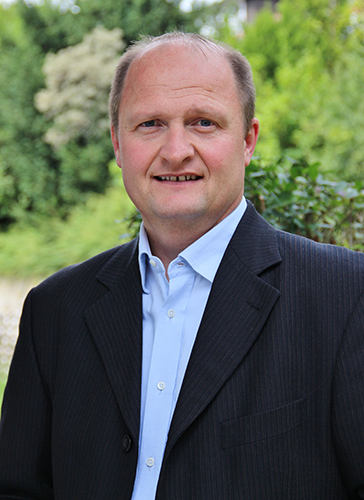Tübingen, 25.10.2018
DZD Researcher Norbert Stefan Appointed Visiting Professor at Harvard Medical School
Professor Norbert Stefan, MD, Heisenberg Professor for Clinical Experimental Diabetology at the University of Tübingen and researcher at the German Center for Diabetes Research (DZD), was awarded a visiting professorship at Harvard Medical School. There he will expand his research on the prevention and treatment of type 2 diabetes and, in close cooperation with his American colleagues, establish new structures of interaction in the field of diabetes research with the University of Tübingen and the DZD. In mid-September he gave his inaugural lecture in Boston.
At Harvard, Stefan works with Professor Morris White of the Division of Endocrinology of the Department of Medicine, Boston Children's Hospital. Together, they want to expand and deepen hepatokine research * to elucidate the role of fatty liver in the development of type 2 diabetes and cardiovascular disease. In addition, joint clinical trials are planned to investigate the effects of fat distribution disorders on the risk of type 2 diabetes and its complications in adolescents and adults. The aim is to establish a close scientific cooperation in diabetes research at the renowned Harvard Medical School with the Medical Clinic IV of Tübingen University Hospital, Helmholtz Zentrum München and the DZD.
Stefan holds the Heisenberg Professorship for Clinical Experimental Diabetology at Medical Clinic IV of Tübingen University Hospital, funded by the German Research Foundation (DFG). He also heads the Department of Pathophysiology of Prediabetes at the Institute for Diabetes Research and Metabolic Diseases (IDM) of Helmholtz Zentrum München at the University of Tübingen. In close cooperation with Professor Hans-Ulrich Häring, director of Medical Clinic IV and the IDM Tübingen, his research focuses on the precise characterization of the risk of type 2 diabetes. As part of the clinical-experimental research approach, Stefan has developed groundbreaking concepts for stratifying the risk of diabetes. These include the identification and investigation of metabolically healthy obesity, metabolically abnormal normal weight, hepatokines (liver hormones) and the determinants of the success of lifestyle intervention to prevent type 2 diabetes and its sequelae.
The focus of his work in recent years has been the investigation of the causes and consequences of non-alcoholic fatty liver disease. Stefan has led the DZD's first multicenter study on the treatment of non-alcoholic fatty liver disease and has been honored with many national and international scientific awards.
*Hepatokines are liver proteins
Media Contact:
Birgit Niesing
German Center for Diabetes Research
Ingolstädter Landstraße 1
85764 Neuherberg
Germany
Phone: +49 (0)89-3187-3971
Email: niesing(at)dzd-ev.de
Scientific Contact:
Professor Norbert Stefan, MD
Tübingen University Hospital
Medical Clinic IV
Otfried-Müller-Straße 10
72076 Tübingen
Germany
Phone +49 (0)7071 29-80390
Email: norbert.stefan(at)med.uni-tuebingen.de
The German Center for Diabetes Research (DZD) is one of six German Centers for Health Research. It brings together experts in the field of diabetes research and combines basic research, epidemiology and clinical application. By adopting an innovative, integrative approach to research, the DZD aims to make a substantial contribution to the successful, personalized prevention, diagnosis and treatment of diabetes mellitus. The members of the association are Helmholtz Zentrum München - German Research Center for Environmental Health, the German Diabetes Center (DDZ) in Düsseldorf, the German Institute of Human Nutrition (DIfE) in Potsdam-Rehbrücke, the Institute of Diabetes Research and Metabolic Diseases of Helmholtz Zentrum München at the University of Tübingen, and the Paul Langerhans Institute Dresden of Helmholtz Zentrum München at the University Medical Center Carl Gustav Carus of TU Dresden, associated partners at the universities in Heidelberg, Cologne, Leipzig, Lübeck and Munich, and other project partners. Further information: www.dzd-ev.de
As German Center for Environmental Health, Helmholtz Zentrum München pursues the goal of developing personalized medical approaches for the diagnosis, therapy and prevention of major common diseases such as diabetes mellitus and lung diseases. To achieve this, it investigates the interaction of genetics, environmental factors and lifestyle. The head office of the center is located in Neuherberg to the north of Munich. Helmholtz Zentrum München has approximately 2300 staff members and is a member of the Helmholtz Association, a German research organization comprised of 18 scientific-technical and medical-biological research centers with a total of about 37,000 staff members. www.helmholtz-muenchen.de
Founded in 1805, Tübingen University Hospital is one of the leading centers of German university medicine. As one of the 33 university hospitals in Germany, it contributes to the successful combination of high-performance medicine, research and teaching. Well over 400,000 inpatients and outpatients from all over the world benefit annually from this combination of science and practice. The clinics, institutes and centers unite all specialists under one roof. The experts work together across disciplines and offer every patient optimal treatment based on the latest research results. Tübingen University Hospital conducts research for better diagnoses, therapies and chances of cure, many new treatment methods are clinically tested and applied here. Neurosciences, oncology, immunology, infection research, vascular medicine and diabetes research are the main areas of research in Tübingen. The University Hospital is a reliable partner in four of the six German Centers for Health Research initiated by the German government. www.medizin.uni-tuebingen.de


